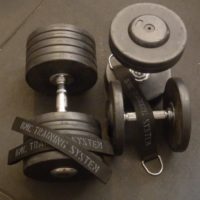Matters of Resistance, Part 1: Essential Tips
What is intensity and how does it contribute to a bodybuilder’s progress?
The intensity of a weightlifting exercise is determined primarily by the resistance being used by the bodybuilder. Resistance, or the weight of the plates themselves, has a marked effect on the bodybuilder’s performance.
Using lower resistance or lighter weights often allows the bodybuilder to perform more reps and sets.
An increase in reps and sets theoretically boosts a person’s calorie-burning capability during the workout, making him less likely to store excess fat (assuming that all other ideal conditions are present.
Using higher resistance or heaviest weights on the other hand, tends to create micro-damage in the target muscles. Micro-damage is necessary to improve the size and strength of muscle tissues. Note that micro-damage is very different from a muscle injury!
The Tips
Do you feel confused about reps, sets and intensities?
Admittedly, these three concepts can become confusing after a time because there are innumerable combinations you can use and it’s difficult to ascertain which combination is more effective if you have limited time to observe the actual outcomes.
There’s no need to grope in the dark – we’ve compiled an expert list of tips that will make intensity adjustments a breeze:
1. Don’t Force It! – We know that there are many bodybuilders capable of lifting more than 200 pounds at a time and it actually pains many beginners that they can’t lift as many weights as the older bodybuilders.
However, it still doesn’t make sense to force your muscles to strain against resistance that you know you can’t handle yet. If you can’t lift a particular weight eight times in succession without heavy straining, your muscle’s total load is too high. Reduce the resistance and try again.
2. Use the Higher Limit – Reps, sets and intensity all come together when you’re deciding how much weight or resistance to use in a particular movement. No one can actually predict how much resistance a person can handle unless it’s a person’s longtime physical trainer.
Use the principle of variable weight when you are deciding how heavy your plates are going to be in a particular movement.
If you want to perform twelve repetitions, load your bar/s until you can perform only twelve reps maximum. If you can perform 10 more reps easily, then the resistance is too low. Adjust it until 12 repetitions become the maximum reps you can manage for that movement alone.
The trick is to lift weights that aren’t too heavy but are heavy enough to stimulate muscle development.
It sounds incredibly difficult at first but if you just keep adjusting the resistance according to your training program, this piece of advice will make sense.
3. Goals are Good But Excellent Form is Even Better – It’s normal for new bodybuilders to set ideal goals for themselves, especially during the first year of training. The “hunger” to do more and lift heavier becomes more pronounced as a new bodybuilder begins to feel his natural strength increasing by the week.
At certain points in your journey, you may be tempted to join the “Cheater’s Gang” so you can lift heavier weights without straining your muscles too much.
The “Cheater’s Gang” is composed of bodybuilders who swing, jerk and bounce weights like they were plastic toys. It’s amazing that people aren’t getting hurt in gyms when members of the “Cheater’s Gang” are throwing around weights.
Don’t join them. Don’t sacrifice your technique and form!
Again, our main concern is your safety when you are training in the gym. Swinging weights and bouncing heavy bars off your chest is the direct opposite of excellent form and gym safety!
Never mind that other people are doing these unsafe movements; they will be alone when they run into an accident or when a muscle or tendon suddenly gives away.
If you can bench 200 pounds perfectly but cannot handle 220 pounds without bouncing the bar off your chest, stick to 200 pounds for now. If your can only curl up to 35 pounds, there’s no point in attempting to curl 50 pounds if you feel excruciating pain.
4. Be Patient – Everything about bodybuilding requires hard work and patience. If you want fast results in everything that you do, bodybuilding is not for you.
However, if you’re willing to wait and work quietly to accomplish your goals, this sport will bring you immeasurable happiness! No effort is ever wasted with physical training plus you’ll get an amazing physique in the end!



